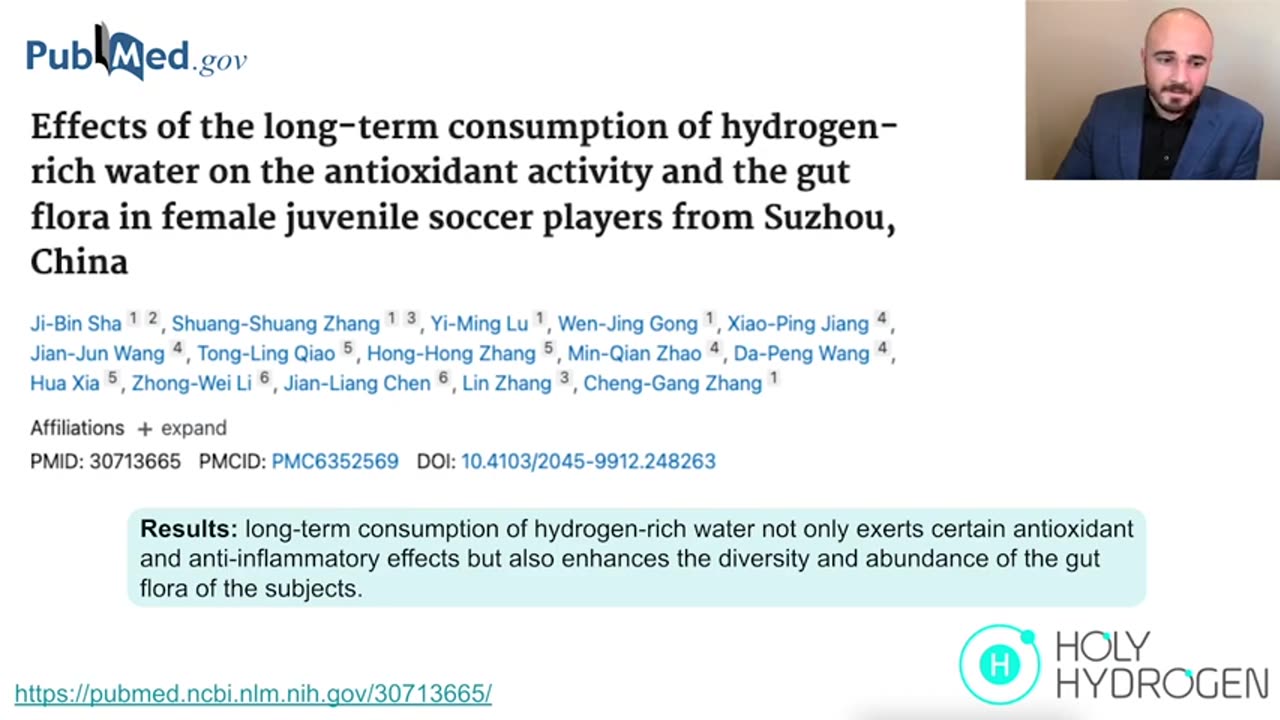Premium Only Content

Holy Hydrogen - Science Behind The Health Benefits of Molecular Hydrogen
Order a Lourdes Hydrofix: https://holyhydrogen.com/Save$100
use coupon code: save$100 upon checkout, saves you $100.
DISCLAIMER:
This webinar represents my best attempt to explaining scientific studies about hydrogen and its potential use as a therapeutic agent. The content here should not be taken as medical advice. The content here is for informational purposes only. Because each person is so unique, please consult your healthcare professional for any medical questions.
2:01 What Is molecular hydrogen?
3:48 Molecular hydrogen research
5:09 Therapeutic potential of molecular hydrogen
10:49 Cellular effects of hydrogen on health as an antioxidant & signal modulator
14:03 Therapeutic potential of molecular hydrogen in medical and clinical applications
15:03 Human Disease Treatment
15:48 Hydrogen Neutralizes Toxic Radicals
17:25 Hydrogen Stimulates ATP Production & Mitochondria
19:38 Hydrogen & Neurological Health
21:55 Hydrogen & Cancer
25:32 Hydrogen and Diabetes, Obesity, and Metabolic Syndrome
27:30 Hydrogen and Cardiovascular Health
29:38 Hydrogen and Digestion & Gut Health
33:22 How to Use Hydrogen
44:45 Help us Share Hydrogen (affiliate opportunity)
Right now, molecular hydrogen is shown to have therapeutic potential in over 170 human and animal disease models. Essentially, every organ and system in the human body.
As we move through this lesson, you’ll see research on hydrogen from all these different journals, many of which are peer reviewed and have a high impact factor. In 2007, there were only about 50 articles that were published on the medical effects of hydrogen gas and its potential as being therapeutic.
But no one really took a lot of interest until this groundbreaking article was published in the journal, "Nature Medicine," which is one of the most prestigious, highly respected journals. Since then it’s been cited over 1300 times and research has taken off exponentially
We’re starting to see research piling up in the united states at some very prestigious programs.
One of the most important studies came from Loma Linda University in 2013 by Dixon and colleagues. They say that hydrogen has marked therapeutic potential to help with the top 8 fatality causing diseases listed by the CDC.
These are cardiovascular, respiratory, cerebrovascular, alzheimer’s, Diabetes, malignant neoplasms, Influenza and Pneumonia, and Nephritis. If that doesn’t get you thinking, rewind and listen again. According to Dixon, hydrogen shows therapeutic potential in 8 of the top fatality causing diseases. So now we wonder -
How does hydrogen exert these biological effects? Like I said, it has this therapeutic potential in essentially every organ of the human body. But how?
Well, the original theory was from this article I mentioned - "Hydrogen acts as an antioxidant by selectively reducing cytotoxic hydroxyl radicals." Note the word “selective” - we’ll bring that up again later. So let’s dissect that title. What are free radicals?
Just so we understand, free radicals have an unpaired electron which means they're very reactive. Then you also have the reactive oxygen species like Hydroxyl radicals and a few other strong oxidants that can cause damage,
which, as you see here, they can damage RNA, DNA, protein, cell membranes, they’re linked to cell death, and basically every disease there is, neurological disorders, inflammatory disorders, cancer, diabetes, and the list goes on and on.
How are these reactive oxygen species generated? Primarily, in the mitochondria through the electron transport chain. Don’t worry if this doesn’t make sense, but for those interested, oxygen reduces to superoxide, and then can go on to form hydrogen peroxide, hydroxyl radicals, and other oxidants and pro-oxidants, which cause all this damage. Notice that most of the damage is in the mitochondria inside of the cell.
The body has our own self-defense system that is prepared to deal with normal amounts of oxidative stress. For instance, we need oxygen to breathe. And every time you breathe oxygen, around 3% of that oxygen can actually turn into these cytotoxic oxygen radicals that can damage your body. Because this is a natural process, the body is prepared to defend against it. We have various peptides and enzymes to help protect our bodies. reducers like glutathione, superoxide dismutase, catalase, and a number of other things.
Our lives are balanced between oxidation and reduction. You could also consider it like a battery with a negative and positive charge. Life is totally balanced on this. On the one side, you have oxidants that the body needs. And then on the other side, you have reducers to balance out the oxidants. When this relationship is out of balance with too many oxidants or reducers, you’ll end up with oxidative stress or reductive stress.
-
 3:03:27
3:03:27
vivafrei
11 hours agoEp. 242: Barnes is BACK AGAIN! Trump, Fani, J6, RFK, Chip Roy, USS Liberty AND MORE! Viva & Barnes
79.4K32 -

Dr Disrespect
9 hours ago🔴LIVE - DR DISRESPECT - MARVEL RIVALS - GOLD VANGUARD
131K27 -
 1:15:00
1:15:00
Awaken With JP
8 hours agoMerry Christmas NOT Happy Holidays! Special - LIES Ep 71
114K100 -
 1:42:21
1:42:21
The Quartering
9 hours agoTrump To INVADE Mexico, Take Back Panama Canal Too! NYC Human Torch & Matt Gaetz Report Drops!
88.9K89 -
 2:23:15
2:23:15
Nerdrotic
9 hours ago $10.10 earnedA Very Merry Christmas | FNT Square Up - Nerdrotic Nooner 453
67.4K6 -
 1:14:05
1:14:05
Tucker Carlson
9 hours ago“I’ll Win With or Without You,” Teamsters Union President Reveals Kamala Harris’s Famous Last Words
150K311 -
 1:58:31
1:58:31
The Dilley Show
9 hours ago $30.88 earnedTrump Conquering Western Hemisphere? w/Author Brenden Dilley 12/23/2024
125K33 -
 1:09:59
1:09:59
Geeks + Gamers
10 hours agoSonic 3 DESTROYS Mufasa And Disney, Naughty Dog Actress SLAMS Gamers Over Intergalactic
88.3K20 -
 51:59
51:59
The Dan Bongino Show
11 hours agoDemocrat Donor Admits The Scary Truth (Ep. 2393) - 12/23/2024
807K2.71K -
 2:32:15
2:32:15
Matt Kohrs
22 hours agoRumble CEO Chris Pavlovski Talks $775M Tether Partnership || The MK Show
121K31